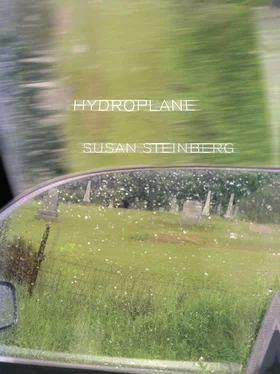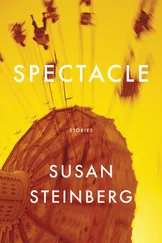Susan Steinberg - Hydroplane - Fictions
Здесь есть возможность читать онлайн «Susan Steinberg - Hydroplane - Fictions» весь текст электронной книги совершенно бесплатно (целиком полную версию без сокращений). В некоторых случаях можно слушать аудио, скачать через торрент в формате fb2 и присутствует краткое содержание. Год выпуска: 2006, Издательство: Fiction Collective 2, Жанр: Современная проза, на английском языке. Описание произведения, (предисловие) а так же отзывы посетителей доступны на портале библиотеки ЛибКат.
- Название:Hydroplane: Fictions
- Автор:
- Издательство:Fiction Collective 2
- Жанр:
- Год:2006
- ISBN:нет данных
- Рейтинг книги:4 / 5. Голосов: 1
-
Избранное:Добавить в избранное
- Отзывы:
-
Ваша оценка:
- 80
- 1
- 2
- 3
- 4
- 5
Hydroplane: Fictions: краткое содержание, описание и аннотация
Предлагаем к чтению аннотацию, описание, краткое содержание или предисловие (зависит от того, что написал сам автор книги «Hydroplane: Fictions»). Если вы не нашли необходимую информацию о книге — напишите в комментариях, мы постараемся отыскать её.
Hydroplane: Fictions — читать онлайн бесплатно полную книгу (весь текст) целиком
Ниже представлен текст книги, разбитый по страницам. Система сохранения места последней прочитанной страницы, позволяет с удобством читать онлайн бесплатно книгу «Hydroplane: Fictions», без необходимости каждый раз заново искать на чём Вы остановились. Поставьте закладку, и сможете в любой момент перейти на страницу, на которой закончили чтение.
Интервал:
Закладка:
And I started to drain, my mother's word, more decent, she thought, than piss or pee or whatever we said as kids.
I spied the girl's black slipper under the divider, and I thought how small; my feet would never have fit in shoes so perfect and small, and how curious, too, her shoes, they were dry. In a blinding downpour. How odd.
I thought, did she hear how my big, soaked shoes had squeaked across the tiles on my way to the stall like a bad hinge worn from use. I could have blushed, were I that type, and had she heard my shoes, cheap as they were, squeaking across, and she must have heard, her shoes being so curiously dry; they were slippers; who wouldn't have heard.
Like buffalo, my mother once piped through a smirking mouth. Like a whole herd of buffalo coming through the house, and I laughed with the neighbors. You're funny, I said.
Well, this girl must have been on her way out, and the rain must have rained during her dinner, for she was dry. And I was sure she had already eaten, for she did seem, somehow, already fed, satisfied, it seemed, in the way she took her time.
I slowed my speed to hers.
I thought of her hands, small, propping her up from the seat.
I thought of her face, her gaze on the door of the stall.
And I knew her date waited at the bar, a wiry one, chewing a toothpick, taking a mint for later.
And I could tell they would leave, these two. He would take her somewhere, to a lot, to sit, to kiss; I knew this part, the rush.
There was no denying the heat of hands on the back.
My mother would have said, That animal, had he been mine looking so rough as that, looking him toe to face as he sucked his toothpick waiting for his girl.
My mother would have said, And where does he work, Am I right.
She would have smirked, She had better not bring that one home.
The neighbors would have laughed into their shirts, their knees.
I would never have brought one home.
The neighbors had daughters too.
And the daughters never brought them home.
And if I told the neighbors a thing or more of their daughters. I had spied those nights in summers. I had seen a thing or more.
But I would watch my tongue. I always watched it.
I was decent, I was.
So much so, I thought to tell her to wait — it was storming sideways — and I almost did tell her, looking at her perfect slipper, Wait. But we were in separate stalls, as it was, and I would never have struck up talk.
I was decent.
And surely her date would say, Let's wait; he had brains, sure, and would buy the drinks — for him something cheap in a shot glass, for her something sweet with a cherry. But strong.
She could take it.
I could tell.
And perhaps I would have a drink at the bar with the girl and her date, a shot, perhaps, and quick I would eat; I was starved.
We would clink our drinks, give a toast to life, then laugh at the storm, at the three of us sitting there, caught.
I would leave soon as I could; I would speed. Just one more hour, then dinner, reheated, but I needed to dry before my mother saw me so soaked.
I sat hard, draining, not wanting to rise just yet, and she was beside me, a wall between us, a thin divider, and she drained as well, and drained, it seemed, at the very same pressure, the very same pitch and speed.
Crazy to think such thoughts I thought. But I wasn't one to blush.
I could barely pull up my rain-soaked skirt.
I heard her rise, adjust.
And I wondered of this date outside the door, some wiry steady, I knew he was. He was wiry-fingered, and I wondered of him. Of them. Of what they would do in the lot. I knew of tongues, the taste of mint; I knew nights in lots, hands hot on my back, those wiry ones I loved.
Then barefoot, creeping across the grass, I could see my window. I was golden.
But the neighbors' windows always lighted. Their curtains parted shining squares of light on the grass as I pushed up my window.
Caught.
I always wondered how to fit in.
I almost always found a way.
The neighbors' lights went off. The grass below my window blacked.
And I watched the ceiling from the bed, thought of the night, of the lot, of the wiry one, the rush of him, whoever he was, and I stayed in bed still feeling his hands, still hearing the suck and suck of us.
It was summer.
At night I returned to the lot.
So I knew they were going to sit in a lot, these two, perhaps the one out front.
My car was in that lot, the keys in the car, the motor running. I had so needed to drain the last several miles, I parked and ran, not thinking.
And now I opened the door to the stall, ran water, faced the mirror, faced her face in the mirror.
I would explain her face.
How satisfied.
And I would explain the weather.
It was thought to be drizzling but grew to a downpour, I swear it.
My mother would shake a plate of blackened food below my face, saying, That ungrateful, The dinner was cooked and recooked and recooked.
The neighbors would nod their heads, make the faces, then the arms around my mother's back that say, You've worked so hard and she's still good for nothing.
Let her go already.
I would say, Surely I'm good for something.
Surely the neighbors knew I was.
My mother would pitch the plate to the table, storm to her room, slam the door, crying, dramatic.
I would shake my head, say, That leaky faucet, and laugh alone.
I would wait with the neighbors until dark, until one of them walked me to my car, said, Go.
It was always this.
I was always late.
I was always waiting, then leaving red-faced.
And here I was on my way.
I would stall.
It was glorious with the hum of the fan, the flower soap smell, the sucking sound of the drains. And lord she was tall, I saw, as we soaped our hands in side-by-side sinks under the light.
I would explain her turn of the faucet, the steam in the mirror.
Then she was gone from the mirror, so I turned my faucet.
So it wasn't just me there.
You see.
It never just was.
If I told the neighbors, Look.
It wasn't just me there.
I would tell them, Look.
Those brainless good-for-nothings, and they knew it, the neighbors, their animal daughters I had seen in lots at night.
Take a look at your girls.
I would watch my tongue.
I would watch it go.
Your girls, I would say.
Banged-up knees and brainless.
Sweet they seemed.
Indecent.
I had the rush of hands on my back until late. The girls had hands rushing all the way up and up. And more. I knew. I had spied.
Just they came home early. They were sweet in their dresses. A hello to their mother, the father, a kiss in the air, and everyone went to their rooms.
Just they were animals that way. Rushing through it. Rushing home.
And they didn't sleep but went to their windows, the daughters, their mother, the father, to catch me. They waited for me to walk across grass, to catch me at my window, golden.
Sure, they always caught me.
I almost always fit right in.
But that once I pushed my window up. The neighbors' windows lighted. It rained.
And the rain had tapped the car in the lot; it had streaked the windows. It was warm in the car, getting hot, hotter, then later, and he said he would drive me home. The rain, he said, but I wanted to walk across the grass.
I walked as slowly as I could.
I pushed my window upward.
My mother stood in my lighted square.
Sure, I couldn't fit.
I almost said, Well, look, I can explain.
I almost said, Let me in.
But she pushed the window down on my fingers, hissing, You indecent good-for-nothing.
The neighbors' lights went off. The grass went dark. It rained.
Читать дальшеИнтервал:
Закладка:
Похожие книги на «Hydroplane: Fictions»
Представляем Вашему вниманию похожие книги на «Hydroplane: Fictions» списком для выбора. Мы отобрали схожую по названию и смыслу литературу в надежде предоставить читателям больше вариантов отыскать новые, интересные, ещё непрочитанные произведения.
Обсуждение, отзывы о книге «Hydroplane: Fictions» и просто собственные мнения читателей. Оставьте ваши комментарии, напишите, что Вы думаете о произведении, его смысле или главных героях. Укажите что конкретно понравилось, а что нет, и почему Вы так считаете.












